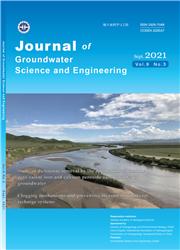Effective groundwater level recovery from mining reduction: Case study of Baoding and Shijiazhuang Plain area
IF 1.8
4区 地球科学
Q3 WATER RESOURCES
引用次数: 0
Abstract
The effective recovery of water level is a crucial measure of the success of comprehensive groundwater over-exploitation management actions in North China. However, traditional evaluation method do not directly capture the relationship between mining and other equilibrium elements. This study presents an innovative evaluation method to assess the water level recovery resulting from mining reduction based on the relationship between variation in exploitation and recharge. Firstly, the recharge variability of source and sink terms for both the base year and evaluation year is calculated and the coefficient of recharge variation β is introduced, which is then used to calculate the effective mining reduction and solve the water level recovery value caused by the effective mining reduction, and finally the water level recovery contribution by mining reduction is calculated by combining with the actual volume of mining reduction in the evaluation area. This research focuses on Baoding and Shijiazhuang Plain area, which share similar hydrogeological conditions but vary in groundwater exploitation and utilization. As the effect of groundwater level recovery with mining reduction was evaluated in these two areas as case study. In 2018, the results showed an effective water level recovery of 0.17 m and 0.13 m in the shallow groundwater of Shijiazhuang and Baoding Plain areas, respectively. The contributions of recovery from mining reduction were 76% and 57.98% for these two areas, respectively. It was notable that the water level recovery was most prominent in the foothill plain regions. From the evaluation results, it is evident that water level recovery depends not only on the intensity of groundwater mining reduction, but also on its effectiveness. The value of water level recovery alone cannot accurately indicate the intensity of mining reduction, as recharge variation significantly influences water level changes. Therefore, in practice, it is crucial to comprehensively assess the impact of mining reduction on water level recovery by combining the coefficient of recharge variation with the contribution of water level recovery from mining reduction. This integrated approach provide a more reasonable and scientifically supported basis, offering essential data support for groundwater management and conservation. To improve the accuracy and reliability of evaluation results, future work will focus on the standardizing and normalizing raw data processing.减少开采有效恢复地下水位——以保定和石家庄平原地区为例
水位的有效恢复是华北地区地下水超采综合治理行动成功与否的重要标志。然而,传统的评价方法不能直接捕捉采矿与其他平衡要素之间的关系。基于开采变化与补给的关系,提出了一种新颖的减少开采水位恢复评价方法。首先计算基准年和评价年源汇项的补给变率,引入补给变率系数β,利用该系数计算有效采减量,求解有效采减量引起的水位恢复值,最后结合评价区实际采减量计算采减量对水位恢复的贡献。本文以保定和石家庄平原区为研究对象,这两个平原区水文地质条件相似,但地下水开采利用方式不同。以这两个地区为例,评价了减少开采恢复地下水位的效果。2018年,石家庄和保定平原地区浅层地下水有效水位恢复分别为0.17 m和0.13 m。减少采动对恢复的贡献率分别为76%和57.98%。值得注意的是,丘陵平原地区的水位恢复最为明显。从评价结果可以看出,水位恢复不仅取决于减少地下水开采的强度,还取决于减少地下水开采的效果。由于补给变化对水位变化的影响较大,单靠水位恢复值不能准确反映回采减少的强度。因此,在实践中,将回灌变化系数与回采对水位恢复的贡献相结合,综合评价减采对水位恢复的影响至关重要。这种综合方法为地下水管理和保护提供了更为合理和科学的依据,为地下水管理和保护提供了必要的数据支持。为了提高评价结果的准确性和可靠性,今后的工作将集中在对原始数据处理的标准化和规范化方面。
本文章由计算机程序翻译,如有差异,请以英文原文为准。
求助全文
约1分钟内获得全文
求助全文
来源期刊

Journal of Groundwater Science and Engineering
WATER RESOURCES-
CiteScore
2.80
自引率
9.10%
发文量
308
期刊介绍:
It publishes original, innovative, and integrative research in groundwater science and engineering with a focus on hydrogeology, environmental geology, groundwater resources, agriculture and groundwater, groundwater resources and ecology, groundwater and geologic environment, groundwater circulation, groundwater pollution, groundwater exploitation and utilization, hydrogeological standards and methods, groundwater information science, climate change and groundwater. The Editorial Board is composed of more than sixty world-renowned experts and scholars, 47% of whom are foreign scientists. Up to now, the foreign authors contributed papers are from USA, Japan, Canada, Australia, Russia, Mongolia, Thailand and Vietnam.
 求助内容:
求助内容: 应助结果提醒方式:
应助结果提醒方式:


